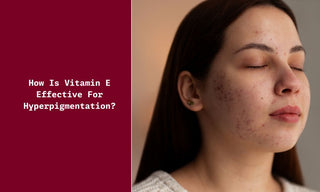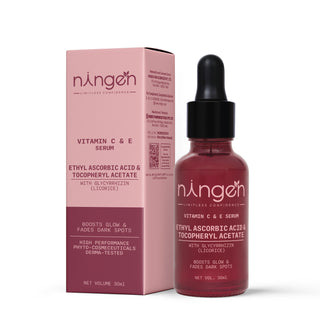"Hyperpigmentation feels like a shadow that dims my natural glow and radiance."
Hyperpigmentation, the darkened patches or spots on the skin, is a concern for many of us.
These spots can be caused by various factors, such as sun exposure, hormonal changes, inflammation, or even certain medical conditions. While many treatments are available, one remedy that stands out is Vitamin E cream.
Vitamin E is a powerful antioxidant that is often praised for its ability to help with skin issues, including hyperpigmentation. But how is Vitamin E effective for hyperpigmentation? What benefits can you expect? Are there any potential side effects? In this blog, we'll explain everything you need to know about using Vitamin E cream for hyperpigmentation. Whether you're dealing with dark spots from acne, sun exposure, or aging, understanding how Vitamin E can help may guide you to a clearer, more even complexion.
In This Article;
- What is Hyperpigmentation?
- Benefits of Vitamin E for Skin Health
- Causes of Hyperpigmentation
- How Vitamin E Helps Reduce Hyperpigmentation
- Effectiveness of Vitamin E Cream for Hyperpigmentation
- How to Incorporate Vitamin E for Hyperpigmentation?
- Potential Adverse Effects of Vitamin E Cream
- Wrapping Up
- TL;DR(Too Long; Didn't Read)
- Frequently Asked Questions
What is Hyperpigmentation?
Hyperpigmentation is when patches of your skin become darker than the rest. This happens when your skin makes extra melanin, the natural pigment that gives your skin its color. These dark spots can be caused by things like sun exposure, acne scars, or hormonal changes. It's common and usually harmless, but many people seek treatments to even out their skin tone.
Benefits of Vitamin E for Skin Health
Vitamin E, a nutrient found naturally in certain foods, can also be applied topically through creams or oils. It is known for supporting the skin in various ways, including moisturizing dry skin, providing relief to those with sensitive skin, and contributing to the overall health of skin cells. One of the lesser-known benefits of Vitamin E is its effectiveness in improving the appearance of hyperpigmentation, which refers to dark spots or patches on the skin. By incorporating Vitamin E-rich products, such as serums or supplements, into one's skincare routine, individuals may notice a gradual lightening of these dark areas, promoting a more even skin tone.

The Role of Vitamin E in Skin Health
Vitamin E, when used as a topical vitamin, plays a pivotal role in skin health, acting as a powerful antioxidant to protect skin cells from damage caused by free radicals and environmental aggressors like UV rays and pollution. It is also known to help in the regulation of vitamin A in the body, which is crucial for healthy skin. The benefits of Vitamin E extend to aiding in blood circulation, which is vital for the nourishment and healing of the skin. Additionally, for those seeking extra moisture, vitamin E oil can be a boon for combating dryness, especially when mixed with a carrier oil to enhance absorption.
Antioxidant Properties of Vitamin E
Vitamin E is heralded for its antioxidant properties, which play a central role in protecting skin cells from oxidative stress. These powerful antioxidants battle against free radicals, thereby reducing their ability to cause harm, which can manifest as premature aging or worsened hyperpigmentation. The topical application of Vitamin E helps to fortify the skin's defensive barrier, reducing the likelihood of skin damage and the appearance of dark spots over time.
Effects of Vitamin E on Skin Cells
On a cellular level, Vitamin E has been observed to have several positive effects on the skin. By promoting cell regeneration, Vitamin E helps in the repair of damaged skin tissue that can result from hyperpigmentation. Furthermore, it aids in stabilizing the skin barrier, which is essential in maintaining skin hydration and resilience against irritants. The use of Vitamin E in various forms, including capsules, oils, or in combination with other skin-boosting vitamins like Vitamin C, can significantly improve overall skin health and lead to the diminution of hyperpigmentation, leaving skin looking revitalized and even-toned.
Table 1: Comparison of Application Methods for Vitamin E
|
Application Method |
Pros |
Cons |
|
Topical Vitamin E |
Targets specific areas, custom concentration |
May require a carrier oil for sensitive skin |
|
Vitamin E Oil |
Intensive moisturization, healing properties |
Can be too heavy for oily skin types |
|
Oral Vitamin E |
Convenient, supports overall skin health |
Dosage must be managed to avoid excess |
|
Vitamin E Serum |
Lightweight, easily absorbed, combined benefits |
May require patch testing for sensitivity |
List of Common Vitamin E Formats in Skincare:
- Pure Vitamin E oil
- Vitamin E capsules (to be punctured and applied)
- Vitamin E-enriched skin creams
- Serums combining Vitamin C and Vitamin E
- Supplements taken orally for overall health benefits
When including Vitamin E in a skin care routine, it's important to understand skin types and potential adverse effects. While many benefit from its application, those with oily skin might prefer a less heavy approach, such as a serum rather than an oil. Sensitive skin types may require patch testing to ensure no adverse reactions occur. As with all skincare products, results can vary based on individual skin conditions and consistent use over time is generally required to see significant changes in the appearance of hyperpigmentation.
Note: Click on the link to know how to use Vitamin E capsules for face.
Causes of Hyperpigmentation
Hyperpigmentation, the darkening of certain areas of the skin, can be caused by a variety of factors. Understanding these causes is key to finding the right treatment and preventing future occurrences. Here are some common causes of hyperpigmentation:
1. Sun Exposure
Prolonged exposure to the sun is one of the most common causes of hyperpigmentation. UV rays stimulate the production of melanin, the pigment responsible for skin color, leading to the formation of dark spots and patches.
2. Hormonal Changes
Hormonal changes, especially during pregnancy or due to the use of birth control pills, can cause a type of hyperpigmentation known as melasma. This condition typically appears as dark, blotchy patches on the face.
3. Inflammation
Post-inflammatory hyperpigmentation (PIH) occurs after the skin has been injured or inflamed. This can happen due to acne, eczema, psoriasis, or other skin conditions, resulting in dark spots where the inflammation occurs.
4. Medical Conditions
Certain medical conditions, such as Addison's disease and hemochromatosis, can cause hyperpigmentation. These conditions affect hormone levels or iron storage in the body, leading to darkened skin.
5. Medications
Some medications, including chemotherapy drugs, antibiotics, and anti-seizure medications, can cause hyperpigmentation as a side effect. These medications may increase melanin production or cause a phototoxic reaction when the skin is exposed to sunlight.
6. Aging
As we age, the skin's ability to regenerate and repair itself slows down. This can result in the accumulation of sun damage and the appearance of age spots, also known as liver spots, which are a form of hyperpigmentation.
7. Genetics
Genetics can play a role in hyperpigmentation. Some people are more prone to developing dark spots and patches due to their genetic makeup. A family history of skin conditions can increase the likelihood of experiencing hyperpigmentation.
How Hyperpigmentation Affects the Skin?
Hyperpigmentation primarily affects the skin by changing its color, texture, and overall appearance. Depositions of melanin in the skin can lead to spots or patches that are brown, black, gray, red, or pink. While typically not harmful, these areas contrast with the regular skin tone and can be a cosmetic concern for many. Beyond physical appearance, hyperpigmentation can also have emotional and psychological effects, leading to decreased self-esteem or self-consciousness for those affected. Addressing hyperpigmentation often involves cosmetic treatments or skincare regimens focused.
How Vitamin E Helps Reduce Hyperpigmentation
Vitamin E is a powerful antioxidant with numerous benefits for the skin, including its potential to reduce hyperpigmentation. Here's how Vitamin E can help:
1. Antioxidant Properties
Vitamin E is renowned for its antioxidant properties. Antioxidants protect the skin by neutralizing free radicals, which are harmful molecules generated by UV radiation and pollution. By reducing oxidative stress, Vitamin E helps prevent and repair skin damage, which can minimize the appearance of dark spots.
2. Skin Repair and Regeneration
Vitamin E promotes skin healing and regeneration. When applied topically, it can help repair damaged skin cells and support the growth of new, healthy skin. This regeneration process can gradually lighten areas of hyperpigmentation, evening out skin tone.
3. Moisturizing Effects
One of Vitamin E's primary benefits is its ability to deeply moisturize the skin. Well-hydrated skin is healthier and more resilient, which can enhance the skin's natural repair processes. Consistent hydration also helps improve skin texture and tone, making dark spots less noticeable.
4. Anti-Inflammatory Properties
Vitamin E has anti-inflammatory properties that can soothe and calm the skin. Reducing inflammation is crucial in preventing post-inflammatory hyperpigmentation, which often occurs after acne or other skin injuries. By calming the skin, Vitamin E helps reduce the risk of developing new dark spots.
5. Enhanced Sun Protection
While Vitamin E is not a substitute for sunscreen, it can enhance the effectiveness of sun protection products. When used in conjunction with sunscreen, Vitamin E helps reduce UV-induced skin damage. This dual protection can prevent the formation of new dark spots and assist in the gradual fading of existing ones.
6. Supports Collagen Production
Vitamin E supports collagen production, which is essential for maintaining the skin's elasticity and firmness. Healthy collagen levels help keep the skin smooth and resilient, making it less prone to discoloration and dark spots.
7. Combination with Other Treatments
Vitamin E is often combined with other skin-lightening agents, such as Vitamin C or retinoids, to enhance its effects. These combinations can provide a more comprehensive approach to treating hyperpigmentation, offering synergistic benefits for skin lightening and overall health.
Note: If you want to know how Niacinamide helps in reducing hyperpigmentation, read our other article on how to get rid of pigmentation and dark spots with Niacinamide.
Effectiveness of Vitamin E Cream for Hyperpigmentation
Research suggests that Vitamin E, especially when combined with other powerful antioxidants like Vitamin C, can be quite effective in addressing hyperpigmentation. The topical application of these antioxidants can result in a lighter appearance of dark spots and an improvement in overall skin health. Vitamin E is believed to help in the regeneration of skin cells and improving blood circulation, which could aid in fading hyperpigmentation over time. It's important to note, though, that results might vary according to skin types, and consistency in application is key to seeing noticeable effects.
How to Incorporate Vitamin E for Hyperpigmentation?
Incorporating Vitamin E into your skincare routine can be an effective way to address hyperpigmentation. Here are some steps and tips to help you do this:
1. Choose the Right Form of Vitamin E
- Topical Vitamin E Oil: Look for pure Vitamin E oil or products that list tocopherol (Vitamin E) as a primary ingredient.
- Serums and Creams: Many skincare products combine Vitamin E with other beneficial ingredients like Vitamin C, which can enhance the overall effect on hyperpigmentation.
- Capsules: Vitamin E capsules can be punctured and the oil applied directly to the skin.
2. Patch Test First
- Before applying Vitamin E to your face, do a patch test on a small area of your skin to check for any allergic reactions.
3. Cleanse Your Skin
- Start with a clean face. Use a gentle cleanser to remove dirt, oil, and makeup.
4. Apply Vitamin E
- Direct Application: If using pure Vitamin E oil or capsules, apply a small amount directly to the hyperpigmented areas. Gently massage it in using circular motions.
- Serums and Creams: Follow the instructions on the product. Typically, a few drops of serum or a small amount of cream are applied to the entire face, focusing on areas with dark spots.
5. Combine with Other Treatments
- Vitamin C: Combining Vitamin E with Vitamin C can enhance the skin-brightening effects. Look for products that contain both, or apply them separately.
- Moisturizer: After applying Vitamin E, follow up with a moisturizer to lock in the benefits.
6. Use Sunscreen
- Protect your skin from further damage by applying a broad-spectrum sunscreen with at least SPF 30. Sun exposure can worsen hyperpigmentation, and Vitamin E can make your skin more sensitive to the sun.
7. Be Consistent
- Incorporate Vitamin E into your daily skincare routine. Consistent use is key to seeing improvement in hyperpigmentation.
8. Monitor and Adjust
- Keep track of any changes in your skin. If you experience irritation or do not see any improvement after a few months, consider consulting a dermatologist.
Tips for Maximizing the Benefits:
- Nighttime Application: Vitamin E is best applied at night, as it can make the skin oily and more sensitive to sunlight.
- Diet: Incorporate Vitamin E-rich foods into your diet, such as nuts, seeds, spinach, and avocados, to support skin health from the inside out.
Potential Adverse Effects of Vitamin E Cream
Vitamin E is widely recognized for its antioxidant properties and skin health benefits, commonly used in various skincare products. While it's generally considered safe for topical use, some individuals might experience adverse effects when using Vitamin E cream.
Potential Adverse Effects of Vitamin E Cream:
- Skin Reactions: Sensitive skin types may develop contact dermatitis, resulting in redness, rash, itching, or swelling.
- Allergic Reactions: Although rare, some individuals may have an allergic reaction to Vitamin E, potentially leading to hives, difficulty breathing, or anaphylaxis.
- Oily Skin Aggravation: Vitamin E is an oil, which might exacerbate oily skin, leading to a greasy appearance or aggravation of acne.
- Wound Healing: Contrary to popular belief, high concentrations of Vitamin E might impair wound healing when applied to fresh scars or open wounds.
Before incorporating Vitamin E cream into a skincare routine, especially for those with a history of sensitivity or skin conditions, patch testing and consulting with a dermatologist is advised. Moreover, one should monitor for any reactions post-application and discontinue use if adverse effects occur.
Check out our curated selection of recommended Vitamin E and related products in the section below.
Wrapping Up
Thank you for reading this article about “How is Vitamin E effective for Hyperpigmentation”, Vitamin E can be a valuable addition to your skincare regimen, helping to reduce hyperpigmentation and improve overall skin health. By choosing the right products, using them consistently, and protecting your skin from sun exposure, you can effectively tackle dark spots and enjoy a more even skin tone.
"In the quest for clear skin, persistence is key. Hyperpigmentation may take time to fade, but every effort is a step towards radiant skin."
Quick View
Hyperpigmentation, caused by factors like sun exposure, hormonal changes, and inflammation, results in dark patches on the skin. Vitamin E, a powerful antioxidant, can help reduce hyperpigmentation by protecting skin cells, promoting skin repair and regeneration, moisturizing the skin, and enhancing sun protection. To use Vitamin E for hyperpigmentation, choose the right form, patch test first, apply consistently, and combine with other treatments like Vitamin C and sunscreen. While generally safe, Vitamin E may cause adverse effects in some individuals, so monitoring and consulting with a dermatologist is recommended.
Frequently Asked Questions
Q1. What is hyperpigmentation?
Hyperpigmentation is when patches of your skin become darker than the surrounding areas due to excess melanin production. This can be caused by sun exposure, hormonal changes, inflammation, or certain medical conditions.
Q2. How does Vitamin E help with hyperpigmentation?
Vitamin E helps reduce hyperpigmentation by protecting skin cells from oxidative stress, promoting skin repair and regeneration, moisturizing the skin, and enhancing sun protection.
Q3. Can I use pure Vitamin E oil on my skin?
Yes, pure Vitamin E oil can be applied directly to the skin, especially on dark spots. However, it's important to patch test first to check for any allergic reactions.
Q4. How often should I apply Vitamin E for hyperpigmentation?
For best results, apply Vitamin E once daily, preferably at night, as it can make the skin oily and more sensitive to sunlight.
Q5. Can Vitamin E be used with other skincare products?
Yes, Vitamin E can be combined with other products like Vitamin C serums or moisturizers to enhance its effectiveness in reducing hyperpigmentation.
Q6. Are there any side effects of using Vitamin E on the skin?
Some people may experience skin reactions like redness, itching, or swelling. Those with oily skin might find Vitamin E too heavy, leading to a greasy appearance or acne flare-ups.
Q7. How long does it take to see results with Vitamin E for hyperpigmentation?
Results can vary, but consistent use over a few months is generally needed to see significant improvement in hyperpigmentation
Q8. Is Vitamin E suitable for all skin types?
While Vitamin E is beneficial for many, those with sensitive or oily skin should use it cautiously. Patch testing is recommended to ensure no adverse reactions.
Q9. Can I take Vitamin E supplements to help with hyperpigmentation?
Yes, taking Vitamin E supplements can support skin health from the inside out. However, it's best to consult with a healthcare provider before starting any new supplement regimen.
Q10. Is Vitamin E a substitute for sunscreen?
No, Vitamin E is not a substitute for sunscreen. While it provides some protection against UV damage, sunscreen is essential for preventing further skin damage and hyperpigmentation.









